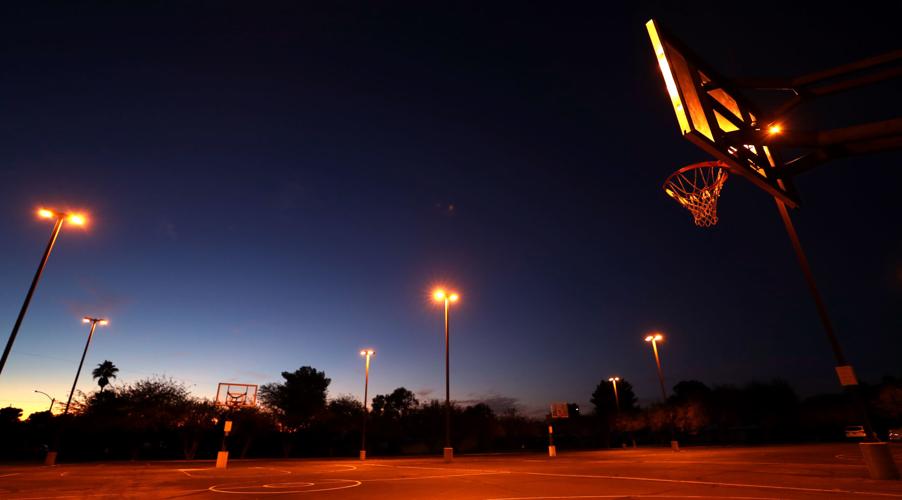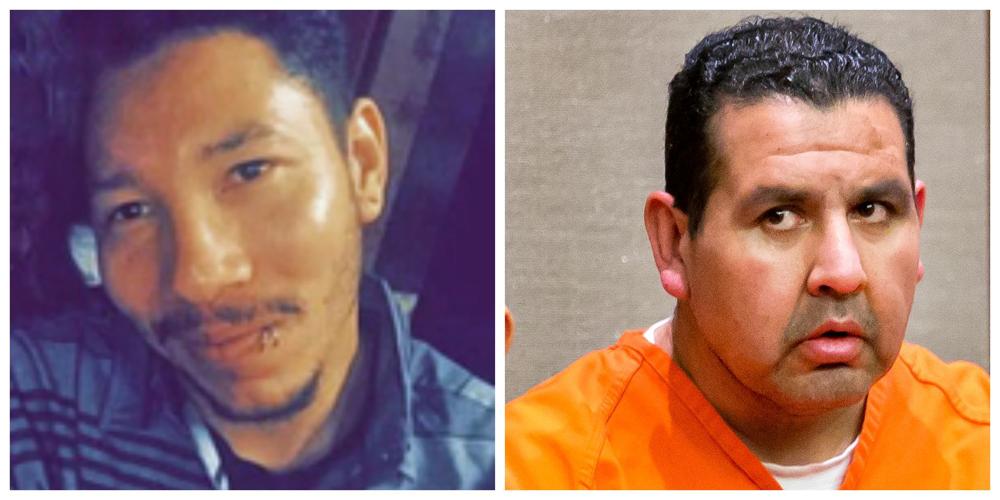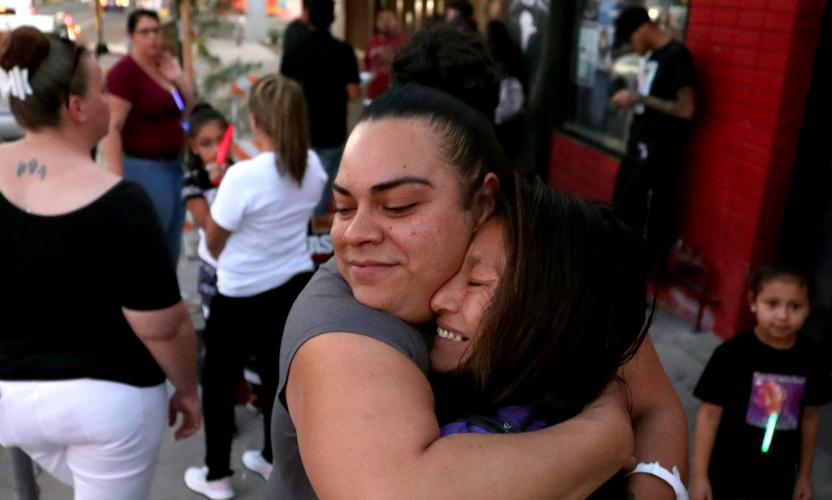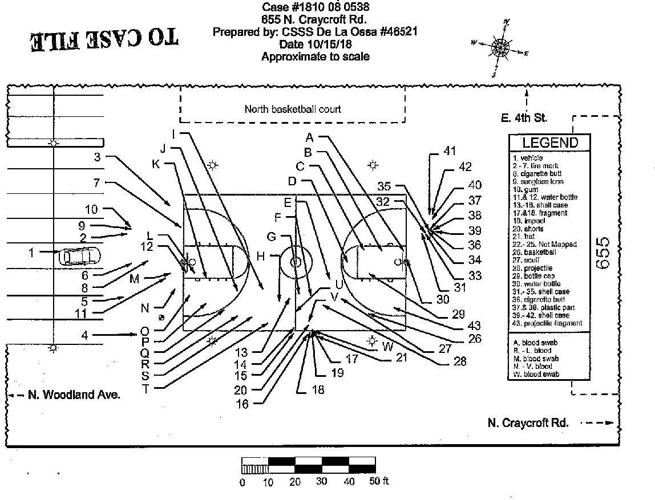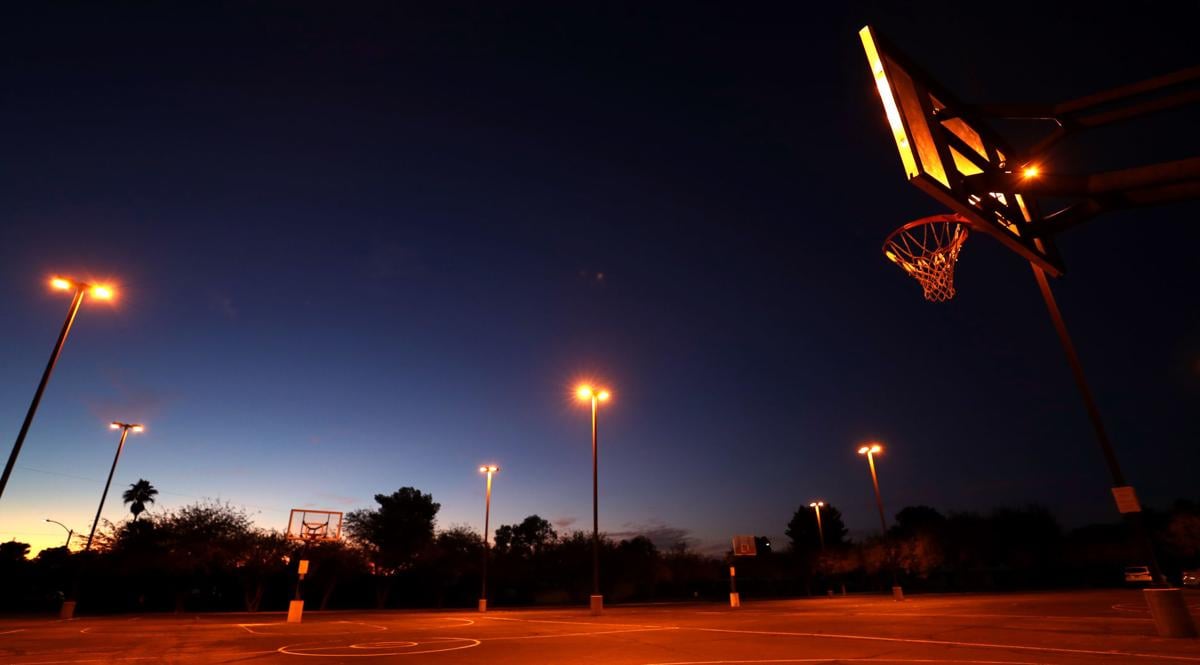The parking lot of Tucson’s Christ Church United Methodist was filled with men playing a pickup basketball game.
After several fouls, trash-talk and a punch hard enough to knock out a teen’s earring during this particular October 2018 game, Vashaun Verrell Baker was gunned down in a hail of bullets in front of several witnesses.
Prosecutors now say in court filings that the admitted gunman, Paul Alvarez Sr., the punched teen’s dad who fired 12 shots into Baker, including three bullets to the head after Baker had fallen to the ground, could go free if a judge agrees with a doctor’s assessment that he is incompetent for trial.
Prosecutors call it a loophole in state law.
“All of this over a basketball game”
Shortly before 8:30 p.m. on Oct. 8, 2018, a Tucson pastor took his wife and three children to the basketball court outside an east-side church to help his son practice for an upcoming game.
When they were done, the family car had a dead battery. They popped the hood and waited for a friend to come and jump-start the vehicle. The pastor’s wife and infant son sat inside the car while he and his other two children continued to shoot baskets. Christ Church United Methodist had become a quiet and popular spot for people to gather in the evenings, and the weather — 63 degrees at sunset and cooler a few hours later — was a welcome break after a long summer.
The pastor noticed a silver car pull into the parking lot. He watched Baker, an old friend who’d been playing basketball, walk up to the driver’s side window.
The pastor heard shots. He yelled at his children to get down, and saw Baker running toward him while clutching his chest.
Baker fell face down to the pavement.
The driver pulled the car up to the wounded Baker and unloaded several more shots then drove away.
The pastor made sure his family was safe before running to his old friend. Baker had been shot 12 times. He was alive, but unresponsive.
The pastor prayed over the mortally wounded Baker. The two had attended elementary school together and partied together as teens before the pastor became involved in the church.
As he prayed, a man who’d been playing in the pickup game asked him to call 911. The pastor began to piece together what might have happened — and who may have been responsible.
“That was my dad,” the pastor heard one of the players say. “My dad is going to pay for this.”
Another player added, “All of this over a basketball game.”

Paul Alvarez Sr., right, is facing a first-degree murder charge in connection with the Oct. 8, 2018, shooting death of Vashaun Baker, left.
Competency in question
The death of Baker, 29, has forever altered the lives of two families. The case against Alvarez Sr., 40, the admitted shooter, has stalled in Pima County Superior Court as his competency to stand trial has been questioned.
In February, the court found Alvarez incompetent for trial, but ruled that his competency could be restored based on reports from two doctors who evaluated him. One doctor said Alvarez was likely suffering from either a delusional disorder or ongoing psychotic disorder, both of which could be treated with medication. Alvarez had told police soon after the shooting that he was a registered executioner and had previously been to prison for killing people, none of which was true. He told officers that he had been on death row in a Florence prison for six minutes before being released.
The same doctor said, however, that he couldn’t rule out the possibility that Alvarez was malingering — faking symptoms to avoid consequences. The Pima County Attorney’s Office said in a recent motion that Alvarez had no “similar delusions” prior to the shooting, and that he had several hours between the shooting and his interviews with police to form a defense.
In December, the jail’s doctor issued a final report saying Alvarez is not competent and not restorable — a decision that could have serious consequences.
On Jan. 3, the Pima County Attorney’s Office asked that a doctor selected by the state conduct his own exam on Alvarez. The county attorney’s office wrote in a motion that it is concerned about what could happen if Alvarez is declared incompetent and not restorable. Under state law, jail doctors have up to 21 months from the time a person is declared incompetent to issue a final decision. Alvarez was declared incompetent in February.
If Alvarez is found incompetent to stand trial without the “substantial probability” that he’ll be restored to competency, the charges against him would be dismissed and he would be released with “no possible effective avenues to ensure” public safety, the motion says.
Arizona law allows the court to simultaneously order the state to begin proceedings for court-ordered mental health treatment, but that does not typically result in a person being physically confined in a secure treatment facility, the county attorney’s office told the Star, noting that it could not specifically address the Alvarez case.
In Arizona, a person can only be committed to a state behavioral facility after demonstrating a chronic unwillingness to receive treatment. Treatment in jail and prison does not count, according to the law.
Since Alvarez was not treated prior to his arrest, the state could either let him go, or place him in a less-restrictive inpatient facility, if he is ruled incompetent. Alvarez would be moved to a state facility only if he causes “serious consequences to himself or others” at the less-restrictive facility, the county attorney’s statement said.
The issue of incompetency and nonrestorability is very different from when a person is found guilty but insane at trial, which allows the person to be sent to the Arizona State Hospital for mental health treatment. In that situation, a person can be transferred to prison to complete his or her sentence if they are no longer suffering from their mental disease or defect.
Pima County Superior Court Judge Michael Butler has set a half-day hearing for March 30 to reevaluate Alvarez’s competency.
Alvarez last appeared in court on Tuesday, sitting quietly in the jury box next to his lawyer, Assistant Pima County Public Defender Nicki DiCampli, during a 15-minute hearing. DiCampli initially objected to the state’s request that Alvarez meet with their doctor, but ultimately agreed provided she be allowed to be present when the two meet.
Alvarez can no longer participate in the restoration to competency program, since the jail doctors already issued a final determination. It’s unclear if Alvarez will continue receiving the medication he was prescribed while in the program.

Elisse Febus, left, gives Elisa Baker, mother of Vashaun Baker, a big welcome hug as about 50 friends and family gathered along Fourth Avenue for a candlelight vigil/walk on the first year anniversary of Vashaun’s death.
“I was just taking care of my family”
Family members on both sides are still wondering how a pickup game could have led to a killing. Police reports, court records and Star interviews detail a physical game that turned violent before Alvarez, the father of two of the players in the game, drove to the scene with a gun.
Vashaun Baker and Emilio Alvarez, then 18, were on opposite teams in the pickup game that ended in Baker’s death. They had met up on the court outside the red brick church several times a week for months. Baker’s brother said the two were friends.
Witnesses said Baker repeatedly fouled Emilio Alvarez during the game, and that the two exchanged trash talk as the situation became more heated. Emilio Alvarez told police that Baker grabbed his hand, pushing his fingers back. The two began to wrestle and Baker punched the teen in the left ear, knocking out his earring.
Emilio Alvarez told police he wanted to fight Baker, but didn’t think it was a good idea since there were families around. He said he walked away and called his dad, asking him to pick him up at a nearby gas station. When talking to police, the teen said he told his father that he’d been punched by a guy he was playing basketball with, but told his dad not to come to the church.
Emilio Alvarez told police that he ended the call and began walking to meet his dad. Minutes later, he heard gunshots coming from the church. He took cover at a nearby office complex, where he saw his father’s car circle the church twice.
He left the area, then received a call from his father saying he loved him.
“I was just taking care of my family,” Paul Alvarez Sr. told his son.
“They were trying to hurt my son”
When police arrived at the basketball court, Alvarez’s older son, Paul Jr. — who was also playing in the pickup game — told officers his father was the shooter. He gave them a description his dad’s silver Chevrolet Impala, but said he didn’t know where his father lived and that they were estranged.
Officers soon learned the elder Alvarez had driven to the house of his girlfriend Eloina Lopez, the mother of his two sons. Lopez told police that she and Alvarez had been together for more than 20 years. She said that while Alvarez didn’t live with her, he came by several times a week to shower, do laundry and see their children. Lopez said Alvarez had been having mental issues since the death of their child five years earlier, and that he had previously tried to kill himself with an overdose.
By the time officers arrived at her home, Lopez had been told a bit about what happened. A little before 8:30 p.m., Paul Jr. called to tell her his father had shot someone. She told Alvarez to leave when he showed up minutes after the shooting. He handed her the key to his car before walking away.
Alvarez called Lopez from his cellphone 10 minutes later and offered some reasoning. “They were trying to hurt my son,” he said, then told her to have the police call him.
About 1 a.m. the next morning, 4 1/2 hours after the shooting, Alvarez returned to Lopez’s house, where a Tucson police officer had been posted. Alvarez surrendered.
Police found a gun and extra magazines on the elder Alvarez, and a live round in his pocket.
He was taken into custody without incident. About two hours after his arrest, Alvarez waived his Miranda rights and spoke to detectives.

Tucson police officers mapped more than 40 pieces of evidence found at the scene of the Oct. 8, 2018 shooting that claimed Vashaun Baker’s life.
Three shots to head fatal
Alvarez told detectives he “was irritated” and “took it personal” when his son called and told him someone had hit him in the side of the head during the game, and the he retrieved a gun that he carried for protection. He told police he bought the gun, a .40-caliber Ruger pistol, for $369 at a pawn shop a year earlier.
Alvarez said he drove to the church and asked a group of men on the basketball court who had hit his son.
Baker stepped toward the car, admitted it was him and apologized, Alvarez told police.
Alvarez said he recognized Baker from a previous confrontation with his teen son. Alvarez told police he shot Baker multiple times and followed him in his car when he tried to run, saying he had to finish him off. Alvarez told the detectives he knew it was wrong to kill Baker, but he felt threatened because there were other men on the basketball court.
The medical examiner who performed Baker’s autopsy said he could have survived the nine shots to his body, but the three shots to his head were fatal.
Alvarez told police he was guilty of first-degree murder and deserved the death penalty. He was booked into Pima County jail on charges of first-degree murder and endangerment, and has remained there since his arrest. The endangerment charges stem from an errant shot that went through the raised hood of the pastor’s car, narrowly missing his wife and son.
“I’m lost without him”
Last fall, on the one-year anniversary of Baker’s killing, a crowd of roughly a dozen friends and family members gathered in front of a Fourth Avenue bar. Many wore black or purple T-shirts with his photo emblazoned across the front.
Attendees gathered inside Mr. Heads to wait for stragglers, sharing stories to help keep Baker’s memory alive. Once everyone had arrived, they lit candles and gave glow sticks to the children in attendance, and walked in procession to Club Congress.
“Vashaun was very adventurous and loving, and he loved to hang out here,” Baker’s mother, Elisa Baker, told the Star during the event. “He was pretty outgoing and had lots of friends. He was a good kid. As he grew up, he was really good in school.”
Baker and his younger brother both worked at Bison Witches, a sandwich and soup place on Fourth Avenue, and he loved to attend the club crawl events and raves that regularly took place on the funky street and in downtown. Baker took care of his mother, living with her until three years before his death.
“He was a hard worker. He was 16 when he first started working and kept working until the day he was murdered,” his mother said.
Baker’s girlfriend, Anette Melendez, was 16 weeks pregnant at the time of his death. She gave birth to the couple’s son, Vashaun Jr., last spring. He is the spitting image of his father, Elisa Baker said.
“He’s going to live through his son,” she said. “He’ll always be in our hearts forever.”
Vashaun Baker’s death was jarring to his mother. More than a year later, she still feels the effects.
“I’m lost without him,” Elisa Baker said.
The delays in Alvarez’s trial have taken a toll on Baker’s family, many of whom have been to court for most of the hearings. Elisa Baker watches Alvarez during the hearings and seethes.
“Because he can sit there and smile and talk,” she said.

Vashaun Baker was gunned down in an east side church parking lot following a dispute during a pick-up basketball game on Oct. 8, 2018.
Baker has become involved with Tucson nonprofit organization Homicide Survivors, hoping that the group can help ease her pain.
“I feel like something’s just stabbing me in my heart and it hurts. I’m in agony all the time,” she said. “I’m surprised I’m still standing, but I have the grandkids to look forward to.”
Melendez said Wednesday that not a day goes by that she doesn’t think about Vashaun Baker, who she says was always ready to help others and had a way of bringing people together.
“I have no doubt he would have been a great dad — loving and caring,” Melendez said, adding that her son is now 9 months old and she can’t believe she’s made it this far without his father by her side. “I carry him with me everywhere I go, in my heart and memories.”
Melendez said all she can do now is make sure Vashaun Jr. “knows exactly” who his father was, and how excited he was to meet his son.
“We were both first-time parents,” Melendez said. “The excitement of starting a family was taken from us, from him.”


